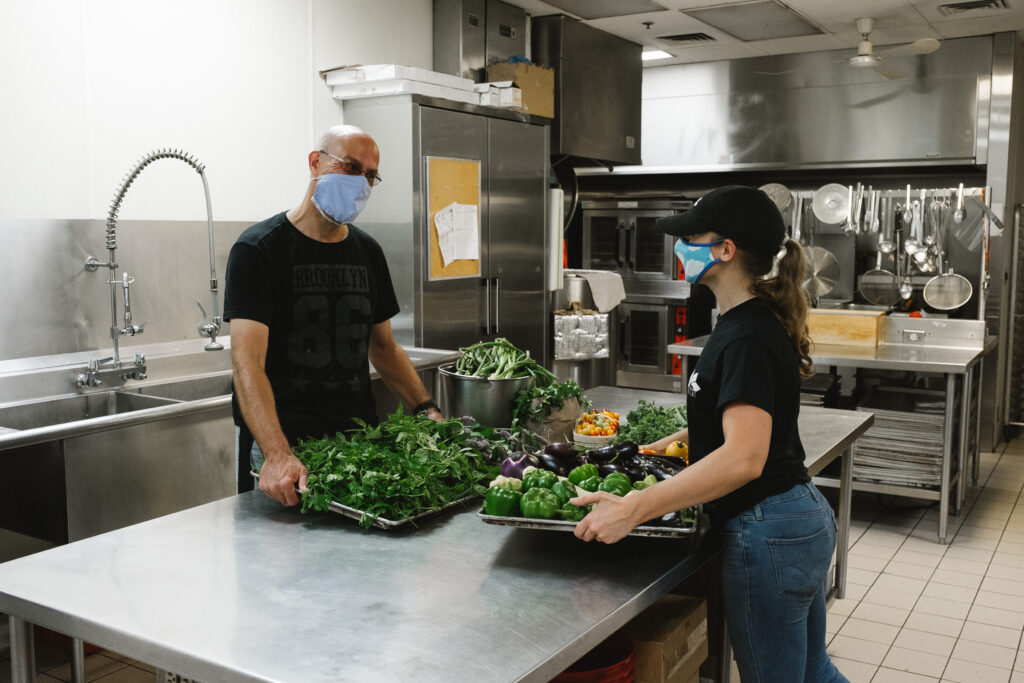Here at MicroHabitat, unused and underutilized urban spaces are given new life in order to feed local communities across Canada and, as of 2022, the United States! Find out how we have established Canada’s largest network of ecological rooftop gardens to feed communities in need.


Food insecurity has become more prominent in recent years, especially with the presence of COVID-19. Food deserts have emerged in urban spaces, where lower income residents have limited access to affordable retail food establishments. As a result, individuals rely on smaller retailers such as convenience stores with limited options for fresh produce. This can result in a poor quality of diet and is a great cause for concern in communities (1).
Now more than ever, food banks are in need of fresh produce in order to provide healthier and more nutritious options for their clients (2).

A successful initiative
To help food banks and local organizations, MicroHabitat launched the Urban Solidarity Farms initiative in March 2020. This program encourages our corporate clients to make a social and environmental commitment by donating the crops of their urban farms to the community. Through this initiative, many food banks have received weekly donations of fresh, healthy food from participating MicroHabitat urban farms.
We have been working closely with clients including: Ivanhoe Cambridge, Complexe Desjardins, Manulife Investment Management Group, BentallGreenOak, Industrial Alliance, Intact Insurance, BBA, GWLRA, First Capital REIT, CAPREIT, Govan Brown, Allied Properties REIT, Northam Real Estate, Triovest, InterRent REIT, Starlight Properties, Crown Management, QuadReal, Warrington PCI Management, DECEIM, and Hines
Together, more than 45,500 pounds of herbs, edible flowers, and fresh vegetables have been donated to our partnered food banks in 2022. This has contributed to the food security of thousands of individuals in need. Many of our local food banks have expressed their delight with our donations, including L’Accueil Bonneau, Dans la rue, le Chaînon, Second Harvest, St Felix Centre, The Lighthouse, The Daily Bread, Sistering, Aboriginal Front Door Society, and Food Stash.
A growing project
Since 2017, MicroHabitat urban farms have been set up in over 130 locations across North America with the intention of donating the harvests to local food banks. Since COVID-19, there has been a growing demand for food banks and local communities to receive fresh produce. This is why we have chosen to formalize the Urban Solidarity Farms initiative. With the success of MicroHabitat’s expansion into Toronto in 2021, and Vancouver and New York in 2022, we are proud to announce our planned expansion into Edmonton, Calgary, San Francisco, Seattle, Chicago, and Denver.
How to participate in the Urban Solidarity Farms program
As an expert firm in urban agriculture, we take care of all the steps related to the development of urban farms. The MicroHabitat team provides complete project management, from the installation of the vegetable garden to its maintenance and the delivery of the crops to the selected food banks. Would you like to devote one of your outdoor spaces to market garden production in order to support and feed communities in need? Discover the MicroHabitat service or contact us for more information.
Let’s transform our city to develop and feed our communities.
Together, let’s cultivate change!
SOURCES:
1) Slater, J., Epp-Koop, S., Jakilazek, M., & Green, C. (2017). Food deserts in Winnipeg, Canada: a novel method for measuring a complex and contested construct. Government of Canada. https://www.canada.ca/en/public-health/services/reports-publications/health-promotion-chronic-disease-prevention-canada-research-policy-practice/vol-37-no-10-2017/food-desserts-winnipeg-novel-method-measuring-complex-contested-construct.html
2) Ricci, T. (2021). Growing demand has food banks looking to fresh food and micro farms as the future. CBC News. https://www.cbc.ca/news/canada/toronto/as-demand-grows-food-banks-look-to-fresh-food-as-the-future-1.6201871
